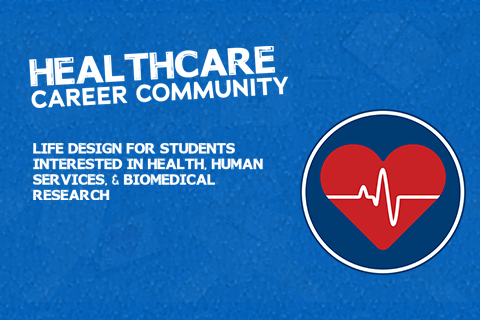Explore a career in Health & Human Services.
Health and Human Services professionals work with individuals in understanding their diagnosis, treatment and their overall well-being. These professions include doctors, dentists, nurses, counselors, psychologists, social workers and speech therapists. These professions include doctors, dentists, nurses, counselors, and speech therapists. Below you can find common skills and attributes of a successful candidate, information on the hiring cycle and application timeline to graduate and professional programs, as well as resources that provide further information on the variety of professions.
Potential Careers
-
Allied Health Professions
Allied health professions apply their expertise to deliver direct patient care, rehabilitation, treatment, diagnostics and health improvement interventions to restore and maintain optimal physical, sensory, psychological, cognitive and social functions. Therapeutic, counseling and social work professions can be done both in a clinical setting, community agency or school.
Successful Candidates Have:
- Strong empathetic abilities and desire to work with patients
- Strong communication and listening skills
- The ability to work within a team
- Leadership skills
- A realistic understanding of the field
- Comfortable in a face paced environment
- Experience interacting with diverse populations
- Critical thinking and problem-solving skills
Potential Technician and Technologist Positions:
- Cardiovascular technologist
- Emergency medical technician (EMT)
- Dental technician
- Medical laboratory/Science technician
- Nuclear medical technologist
- Anesthesiologist assistant
- Ophthalmic laboratory technician
- Radiologic technologist
Potential Therapeutic, Counseling and Social Work Professions:
Potential Counseling Specialties:
Do I Need An Advanced Degree?
- Technicians and Technologists
There are several positions within a clinical setting that require professional training, certification, or an Associate’s degree such as EMT, cardiovascular technologist, and radiologic technician. Learn more information about specific programs and requirements in the academic requirements section through Explore Health Careers
- Rehabilitative Therapies
Most entry-level positions in the rehabilitative and counseling specialty field such as physical therapy, art therapy, mental health counselor, or social work require an advanced degree accompanied with field work experience and professional certification/licensure. Review the education and career section of select programs by clicking on the links above.
-
Medicine, Dentistry and Veterinary
These careers involve the prevention, diagnosis and treatment of illness and disease. What differentiates these individuals is their autonomy of practice.
Potential Careers In Medicine, Dentistry and Veterinary:
- Allopathic medicine
- Chiropractic medicine
- Dentistry
- Optometry
- Ophthalmology
- Osteopathic medicine
- Physician assistant (learn about prerequisites for PA’s)
- Podiatry
- Veterinary medicine
Do I Need An Advanced Degree?
Careers in Medicine, Dentistry and Veterinary typically require many years of schooling, advanced degrees, and/or residencies. Those looking to specialize may also need fellowships. For more information identifying programs and their admissions requirements visit Applying to Health Professions or select applying.
-
Nursing
Nurses promote health, prevent disease and help patients cope with illness. Their scope of practice includes practicing independently as well as through collaboration with all members of the healthcare team.
Successful Candidates Have:
- Strong empathetic abilities and desire to work with patients
- Strong communication and listening skills
- The ability to work within a team
- Handle high emotional and physical demands
- Ability to work in a face paced environment
- Leadership skills
- A realistic understanding of the field
- Experience interacting with diverse populations
- Evidence of community engagement
- Critical thinking and problem-solving skills
Potential Careers In Nursing:
- Clinical nurse specialist
- Licensed practical/vocational nurse
- Nurse anesthetist
- Nurse educator
- Nurse midwife
- Nurse practitioner
- Nurse researcher
- Occupational health nurse
- Pediatric nurse
- Public health nurse
- Registered nurse (RN)
Do I Need An Advanced Degree?
Depending on your role there are various levels degree and educational requirements.
An advanced degree and obtaining certification/licensure are required for most nursing programs such as registered nurse, nurse midwife and pediatric nurse. Learn more information about nursing programs and admissions requirements through American Association of Colleges of Nursing and NursingCAS.
-
Pharmacy
A pharmacist is a licensed doctoral health profession who provides information about medications to patients and healthcare professionals. Pharmacists are concerned with safeguarding the public’s health in matters relating to medication distribution and use and disease state management.
Successful Candidates Have:
- Strong communication and listening skills
- Strong attention to detail
- Leadership skills
- A realistic understanding of the field
- Experience interacting with diverse populations
- Strong empathetic abilities and desire to work with patients
- Evidence of community engagement
- Critical thinking and problem-solving skills
Potential Careers In Pharmacy:
Do I Need An Advanced Degree?
Pharmacists require specialized training, advanced education, and licensure in order to practice. Students considering a career in Pharmacy need to take the Pharmacy College Admission Test (PCAT), a standardized admission test. The PCAT is offered four times a year in June, August, October, and January on specific days in a paper test format.
For information about Pharmacy and Pharmacology admissions requirements visit the American Association of Colleges of Pharmacy and PharmCAS.
For information about the graduate school application process, or to figure out if graduate school is the best option for you, visit the Graduate School Page.
Hiring and Application Cycle
For Internships, the recruiting cycle is on a as-needed, or rolling basis. The more prestigious and competitive opportunities have earlier deadlines in the fall. For graduate and professional programs there are different program deadlines based on each program and school. You can seek guidance from an advisor or directly from any website related to the program you are interested in. For jobs the cycle is typically on demand or during the spring.






